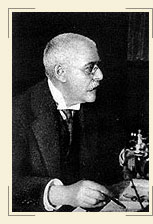|
Spyridon Lampros
Spyridon Lampros was one of the figures that played a leading part in the public life of the Greek State in the late 19th and early 20th century. He  was a professor of history and a University dean, a leading member of the National Society and prime minister in a particularly critical period of contemporary Greece, the period of the National Schism. Moreover, he was one of the men, who by their actions determined the processes of constitution and formation of the Greek sports institutions. He was president of the Panhellenic Gymnastic Society, secretary general of the Committee for the Olympic Games (COG), president of the SEAGS and pioneer in the organization of the Panhellenic Games. was a professor of history and a University dean, a leading member of the National Society and prime minister in a particularly critical period of contemporary Greece, the period of the National Schism. Moreover, he was one of the men, who by their actions determined the processes of constitution and formation of the Greek sports institutions. He was president of the Panhellenic Gymnastic Society, secretary general of the Committee for the Olympic Games (COG), president of the SEAGS and pioneer in the organization of the Panhellenic Games.
Lampros was born in Corfu in 1851 and studied philology in Athens between 1867 and 1871. Then he pursued postgraduate studies in Berlin and Leipzig, where he obtained his doctor's degree, and in 1878 he returned to Athens. In the beginning he was appointed lecturer in the university and gradually he reached the professorial status. He remained in the University until 1917, twice in the capacity of dean, first in 1901-1902 and then in 1912-1913. Of great importance was his contribution to the introduction of new disciplines, such as palaeography and archives treatment (e.g. of Mount Athos monasteries). His auctorial work consists of some hundreds of treatises, many of which were published posthumously. His scientific interests centred on the study of the Byzantium. He is considered a continuer of the work of Zampelios and Paparrigopoulos as to the importance of demonstrating the "Greekness" of Byzantium for proving the "continuance" of Greek culture. In the light of the above, Lampros is considered to be one of the founders of the historical science in Greece and architects of the national historiographic "school", which came to be known as Greek historism.
The Great Idea had been the ideological nucleus of Lampros' thought, whereas his scientific, social and political activity was directed towards the materialization of the irredentist claims of the Greek State. As a result, in 1882 he founded together with Nikolaos Politis, Georgios Drosinis, Timoleon Filimon and others the Historical and Ethnological Society of Greece. In mid-1890s several members of the above society were initiated into the parastate organization National Society. One of them was Lampros, who belonged to a 20-member Supreme Authority of the Society and it seems that for a time he had the role of the leader.
During that period the same people participated in the constituting processes of Greek sport. Lampros was designated president of the Panhellenic Gymnastic Society after the death of Ioannis Fokianos, just a few weeks after the conclusion of the first modern Olympics. From this position he spearheaded the creation of the Greek Association of Amateur Athletics and was the first president of the SEAGS (1897-1906). During his term of office the Panhellenic Games were instituted (1897) and organized (1901). Furthermore, he was placed Secretary General of the reconstituted in 1901 Committee for the Olympic Games, taking active part in the organization of the Interim Games (1906). In the COG he remained until 1917, a year marked by his deposition from all the public offices he held.
The prestige and influence of Lampros, his interest in the public affairs and his close relations to the royal family (e.g. the sports games Sotiria organized by the Panhellenic Gymnastic Society were dedicated to the rescue of king Konstantinos from attempted murder) made him prime minister of the "state of Athens" in September 1916. During the same time Venizelos had created with the support of the Entente the "state of Thessaloniki". It was the time of the National Schism. Lampros remained prime minister until the "unification" and the return of Venizelos to Athens as prime minister. During his term of office occurred the English-French exclusion of Athens and the persecutions of the pro-Venizelist citizens known as Noemvriana. Lampros was held responsible for those incidents. He was put on trial and was condemned to displacement initially in Hydra and then in Skopelos. He remained there until March 1919, when he was allowed to return to Athens, because he was seriously ill. He died a few months later, in July 1919.
|